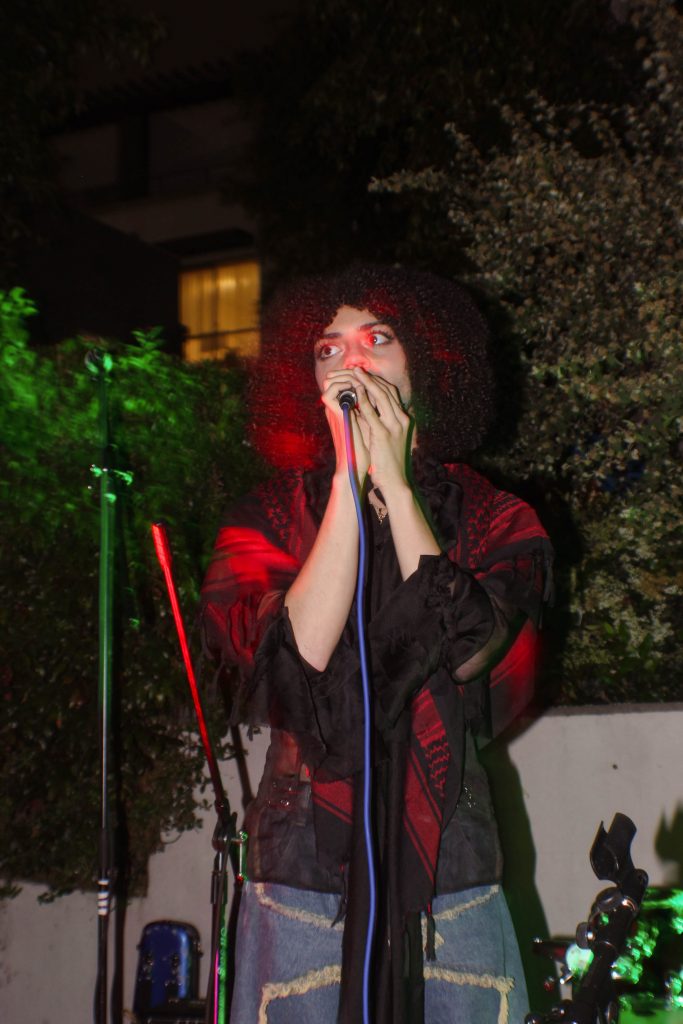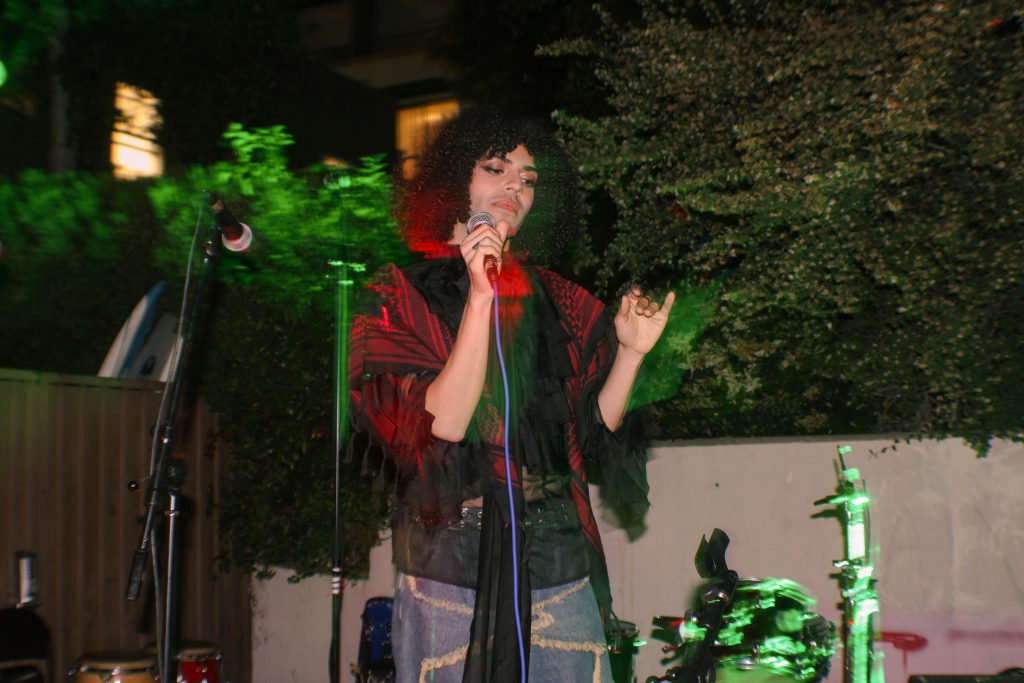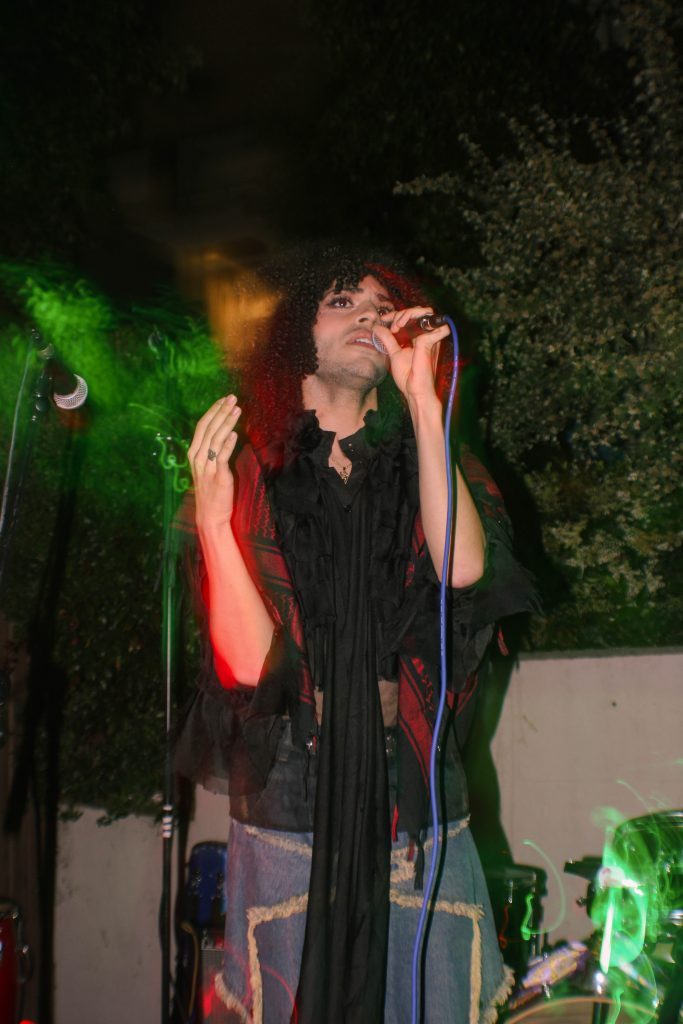Still from “Siren Song” MV, directed by Odin Contreras
UCLA Radio’s Rising Artist Spotlight aims to highlight upcoming artists who have demonstrated unique creativity and talent through their music. Through interviews and features, we delve into their journey, influences, and aspirations, giving listeners a glimpse into the future of music.
On a winter evening in my bedroom, I sat down with musician ILAYALI (Ali Alqatari) for an intimate conversation about their artistic journey. The Saudi-born, LA-based artist has been steadily building momentum in the local music scene, crafting songs that blend ethereal alternative pop sensibilities with deeper explorations of identity, perception, and self-discovery. Ahead of their debut in-house performance supporting Keni Titus at UCLA’s Nimoy Theater on Monday – February 24th at 7pm – Ali opens up about their evolution as an artist – from recording under the name “Lilith in Pieces” to embracing a new creative direction under their current moniker “ILAYALI.” Over the course of our discussion, they share their thoughts on early musical influences, the challenges of being an independent artist, their philosophy on performance, and the delicate balance between vulnerability and empowerment in their work.
This interview has been edited for clarity and brevity purposes.
Interviewed by Chloe Ling
Chloe: What made you first want to pursue music?
ILAYALI: Music was an outlet for me. I was growing up and I was getting bullied, and music was my only escape – listening to albums during car rides and walking around the hallways at school hiding AirPods in my ear. Sound was a metaphorical and literal form of protection. And so just extending to wanting to add to the music, if that makes sense – I was hearing all these different artists’ perspectives, and I guess a part of me felt like I had something to say, and I just went along with it.
Chloe: Do you feel like music in that way is transformational to your identity? Like do you see music as being a way to be aspirational in making yourself a stronger, more resilient person?
ILAYALI: 1,000% for me, personally, music has helped with my self-worth. Something about being able to give voice to even myself, you know, or feel the slightest bit of connection or response from people that support me is so meaningful.
Chloe: Can you talk about artists that inspire you, people that inspire you, anything around you?
ILAYALI: I feel like there’s no limits to what could be inspiring artistically, and that’s the best part of creating art – it’s really about personal preference and what you gravitate towards. For me personally, what’s been inspiring to me always in my music is these ideas of the physical realm, honestly, to be very holistic about it, and the shadow aspect of experiencing it. There’s consequences to being in a physical reality, a tangible reality, and I’m interested in exploring those, whether it impacts your life in a social way or a material way or a geographical way. The material aspect of life is one of the most inspiring parts of it for me – just kind of what it means to be in a body that exists and is perceived. I think about that so much. Artists that connect to my perspective in a way are influential to me – that would be Lana Del Rey, Lady Gaga was a big one, Charli XCX, Lorde, Radiohead, Kate Bush was a huge one for me. Kate Bush inspired me to produce music. Her album “Hounds of Love” and learning that it was self-produced inspired me to make my own music. And then Prince also for similar reasons, and his kind of unabashed ability to exist in a room of just, you know, people who otherwise might be disrespectful to him based on how he looks – I just love that he owned it so much. It really does inspire me to be like a tough, very thick-skinned human being.
Chloe: You’ve recently changed your artist name. Can you tell us a bit about that?
ILAYALI: Initially I was going under the name “Lilith in Pieces” which had very personal connotations for me on my healing journey. It was kind of based on me reminiscing and working on my shadow self and understanding myself on a really thorough basis. But I started to feel reflected back to me the emphasis on that darkness a little too much, even from audience who would refer to me as Lilith. And I was just like, “Hmm, my goal wasn’t to embody that energy” – it was kind of to filter it out of myself, in a way. So I decided to change it, because it felt like it became kind of the focal point, and it wasn’t my focal point – I wanted to be the focal point, rather than an aspect of my experience that I was going through. So I decided to go with ili Ali, because it has very cool aspects to it that are very personal. Also it has my name in reverse, which I’m really obsessed with – the concept of inversion and reflections and symmetry and all those kind of fractals and weird things like that. Having it be a palindrome, having it be symmetrical, is just something that really scratches my brain.
Chloe: Do you feel fully like yourself when you’re performing? Or does it feel like you step into a different persona? Are there any tensions between different versions of you, and is there any pressure you feel from external forces?
ILAYALI: That’s a very interesting question. I think you can’t, just at least personally speaking, I would not feel comfortable going on stage in an ugly outfit – I just could not imagine, because I want to be in my zone. To be in my zone, I do kind of embody, I don’t think a persona, but I think it’s almost like me magnified. It’s me for the stage, it’s me on 10, it’s me on my go-go juice. So I don’t think it’s a separation, but for me, it has been really healthy to create some kind of distinction and understand that as a person, part of my needs happen to be performance. And so trying to funnel that energy more into the project and separate it from my personal life helps make sure that the energy is coming out in the direction that it needs to. It’s almost like water pipes, and re-piping them so that energy comes through the stage and this energy comes through me as the person behind it.



Chloe: You’ve talked about self-assertion, self-reclamation – it’s all kind of reflecting back on yourself. What do those specific words mean to you in this context? I can feel it in the music, but I want to hear what these terms mean to you.
ILAYALI: I do think a lot of my creative output is almost like a mirror. It really does help me see where I’m at. Self-inversion as a concept, to me, is something really big, and I think it’s kind of about being open to seeing everything from every perspective, and seeing things in reverse and flipping things upside down and around and inside out. It’s not very fun to be in my brain, but it is very dynamic and interesting and chaotic in every way. I’m trying to be extremely unapologetic and not care how it comes across, because I just feel so victorious in the feeling that my joy matters the most, and it should, and everyone’s joy should matter the most to themselves. That’s not saying that people shouldn’t care about what other people are experiencing, but I do think it means that you shouldn’t make yourself smaller for others. I think I was doing that my first couple years of school and being here, and I just find that I’m allergic to that now. If someone can’t take it, then I hope the door hits them on the way out.
Chloe: You’ve also brought up imposter syndrome – can you talk a little about that?
ILAYALI: The feeling of imposter syndrome does come out a lot in my music, because I think it’s a time for me. I love just the idea of carrying around this confidence, but then the stage being the time where I’m more really vulnerable. I find that kind of very cathartic and contradictory in a way, because it’s like screaming your secrets. Something about that is so liberating and so empowering to me. I think shame is such a central emotion that I’ve had to experience. And speaking about inverting things, I think inverting shame does not actually yield acceptance. I’m not there yet, but instead of allowing myself to wallow in the shame, I have inverted it. What does shame inverted look like to me? I think it looks like fame, because both are experiences where you are kind of shunned and excluded. But for me, I was like, “You know what? It seems that I’m just living a life right now where I’m gonna be discriminated against either way because of just my presence, and so am I gonna allow it to get to me in the same way that it did before, as shame, or can I kind of alchemize it into this thing where I use it as a power and I own it?” And so I’ve been trying to do that, but I know for a fact that it’s not sustainable. I’m already trying working to replace it with true acceptance. But until then, this works, and fake it till you make it. And if people think I’m insane or cocky or too confident, or narcissistic because I’m doing this right now – well, then I don’t care. It’s about my healing journey and my truth.
Chloe: Do you feel like people try to put you into a box, whether in terms of your genre or otherwise? How do you push against that?
ILAYALI: I rage. I get so angry. I think I feel so helpless when I’m being put in a box that I feel is stifling. I think being put in any kind of box is limiting, and it does make me mad. So I try not to think about it, but the way I rebel against it is by trying to encompass as much as possible in a holistic way, like a presence and a self and kind of a confidence and an unshakability to kind of face that, because it really can get grating and annoying to feel misunderstood or misperceived, or one-dimensional.At the same time, though, it’s none of my business what people think about me and I know what I need to know. And so it’s a balancing act of how much do we care, until we don’t give a fuck.
Chloe: What’s been the most challenging part of navigating the music industry as an independent artist?
ILAYALI: Well, you know, in the music industry, the idea of somebody standing between me and my audience, or me and my truth or me in the extent and fullness of my artistic and creative expression is daunting and scary and unfathomable to me, which is why being independent is satisfying, but it’s very fucking hard. It is so hard because it’s a lot of work, and it’s a lot of resources that you need, and a lot of time, and honestly, you just need help as an artist. Artists are neurotic people, and I think it’s important to either way, whether you’re independent or not, you’re gonna have to have a team. And I can’t wait to have a team, because I can’t do it on my own.
Chloe: What does the ultimate success look like for you and has that definition changed since you started your journey as an artist?
ILAYALI: It’s definitely changed. I think, like, a year ago, I would have said I just want to have enough to live in an apartment and have a little chihuahua and just be independent and be able to travel and just do creative work for a living. But now I’ve kind of pushed it a little bit to the extreme, and I want everything.
Chloe: You’re doing your first theater performance soon – how does that feel?
ILAYALI: I am filled with gratitude. It really is a pinch-me moment, because I talk big game and I like to put up a confident front, but inside, I’m like, “Oh my God, how am I pulling this? This is actually happening.” I’m pulling these things off. They’re actually coming true. And it’s disbelief and gratitude and awe. A lot of gratitude, honestly, and really just humility. It’s obvious that, as an artist, my work is very valuable to me, but that doesn’t mean that it actually has to be valuable to anybody else, and to have anyone like see the value in it and want to experience it or want to help me express it – I am so in awe, so grateful. Those are people I will not forget in the long run of my career. I owe a lot to so many people that have helped me in this phase where I was so down on myself, you know, and they helped inspire my self belief. Can I shout them out? Ethan Ella, I want to thank Harley James, Gustavo Tepela, Amber, Bremmie Nat, thank you guys for giving me a platform. Radio. Love everyone.
Chloe: What’s something that someone’s said about your work that still sticks with you?
ILAYALI: Somebody told me that in a CEC interview, when they were asked what up-and-coming artists at UCLA they’re most excited by, they mentioned me. That was one of the most pinch-me crazy moments I’ve ever had. Like, these things that I do that I don’t even fully realize are actually becoming out into the world and impacting people. My gratitude, thankfully, really does match each moment. None of this is taken for granted. I think I’m probably the only person from my family, school, like city, that I feel like is doing what I’m doing, the way I’m doing it, and the level that I’m doing it. So it feels shocking in a way, but also just awe-inspiring and gratitude-inspiring and humbling.
Chloe: If your debut record could say one thing about yourself as an artist or as a person, what would that be?
ILAYALI: I would want them to see how multi-dimensional everything is from a perspective point of view. You know, I think obviously you can’t have every perspective in a song, but I do try my best to have underneath at least the main perspective nuance. If I’m saying I like to be watched, it’s also with an understanding that there’s a messed up place where that comes from, and me being aware of that is something that I do want people to know. I hope people take away a versatility and a truth, and star quality, hopefully!
Chloe: What do you hope people take away from your music and your performances?
ILAYALI: That you can always retune yourself. You can always choose to vibrate differently. You can always choose a new note. Everything is within reach.

Catch ILAYALI’s first in-house performance and RSVP for Night at the Nimoy for FREE with your UCLA Student Log-On HERE. ILAYALI will be supporting headliner Keni Titus along with Cocona and Willowake. Experience amazing music along with free raffles (courtesy of UCLA Radio, Wonderfront, and Goldenvoice) giving away concert tickets. Tickets are extremely limited – get yours now!
Check out Siren Song below, and follow @ilayali777 to stay updated on their upcoming album!




